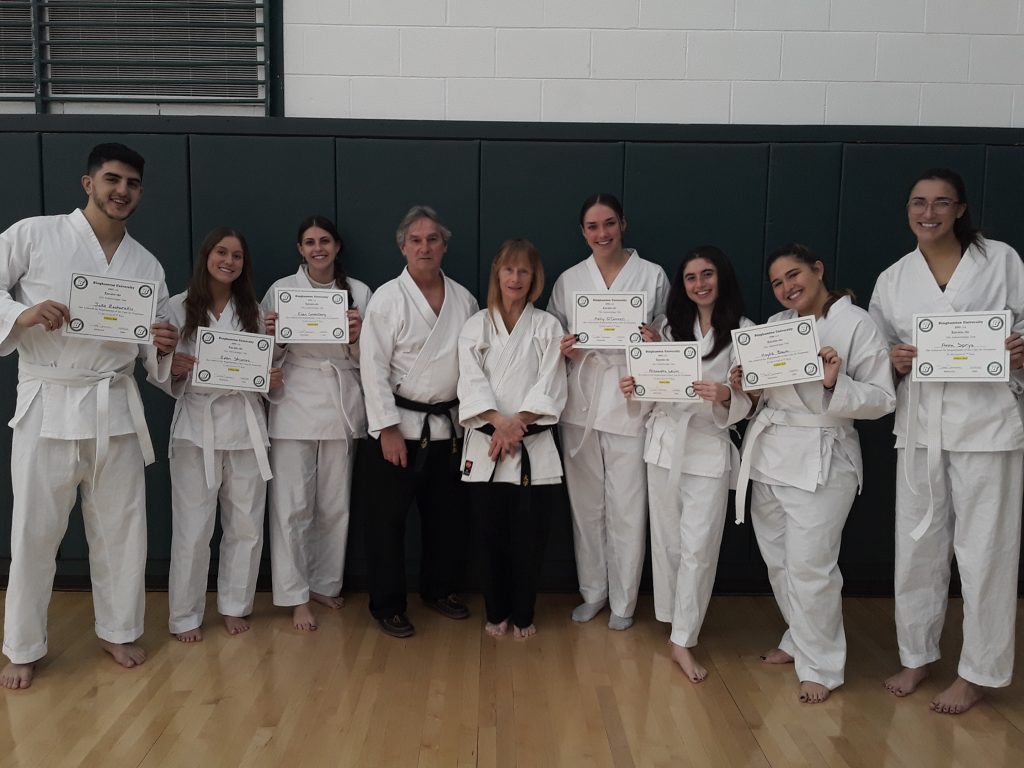Not many students know about Binghamton University’s opportunity to earn a black belt alongside their degree.
Your first college experience is an exciting time. Students build lasting and fleeting friend groups, receive a thorough education and prepare themselves for their dreams. BU is home to a variety of student and campus-run organizations, as well as professional resources, to assist students in determining their futures. While my undergraduate experience was made spectacular by a variety of people, one experience stands out as my most memorable, and recent, endeavor — aspiring toward a black belt in karate.
Dale Iannone, a fifth-degree black belt and karate master and previous United States representative in the World Karate Organization and adjunct lecturer in health and wellness studies, instructs a karate class — HWS 114 — on campus, which many seniors take to fulfill their health and wellness general education requirement. However, if students register for Iannone’s karate class earlier in their college career, they will not only have the opportunity to earn credit as a teaching assistant (TA), but also to work toward earning a black belt in karate. Iannone’s karate school and program, called the University of Karate-do, are recognized through the University.
Lianne Obra, a green belt in karate, current taekwondo student and sophomore majoring in mathematics, joined Iannone’s team of TAs for the fall 2022 semester. Obra encouraged students to try out martial arts, describing her journey from being a white belt her freshman year to an aspiring black belt by graduation. One of Obra’s most memorable takeaways from the University of Karate-do has been learning “the same cool movements” seen in martial arts movies.
“I would recommend others try University [of] Karate-do because it’s a good shot to see if martial arts, or specifically karate, is something they might like,” Obra wrote in an email. “Not only is it fun, but you also get credits for physical education and wellness. Karate helps you improve your coordination and also your confidence when it comes to performing and working with peers, so I’d say give it a shot!”
My experience as a University Union associate, bus driver, legal intern and law school applicant has shown me martial arts is also an interesting talking point for employers in interviews. Being a student in martial arts demonstrates discipline and determination and offers a diverse experience to be applied later in life — inside and outside the workplace.
While learning to box or how to wield a bow staff like your favorite childhood ninja turtles is rewarding enough, some students have also joined Iannone’s University of Karate-do for mental health reasons. Vincent Gatto, a senior majoring in anthropology, described karate’s value beyond pushing oneself and improving one’s self-defense skills.
“I am only a pending green belt who is graduating this semester, but I am confident that I can earn my black belt one day,” Gatto wrote in an email. “If I knew this opportunity was available earlier, I would have absolutely joined my first semester here! Karate is freedom and is a meaningful way to deal with stress or depression. It has helped me deal with my mental health in many ways. I would recommend it to anyone who feels trapped in their heads.”
Those with prior experience in a relevant martial art have the opportunity to advance more swiftly through the program. For example, since myself and a fellow colleague earned our black belts in taekwondo a few years ago, over the course of two semesters we have been able to earn our brown belts in karate.
Iannone’s University of Karate-do is an example of the diversity of educational opportunities at BU. Karate was first brought to the United States via Los Angeles in 1955 by an instructor who had been trained at a university in Japan, according to Iannone. Since this advent, karate dojos specializing in various styles have flourished throughout America’s strip malls and empty storefronts. By beginning your karate career at BU, you have the opportunity to earn a black belt and contribute credit toward your degree without bearing the usual financial burden a karate education at a private dojo entails.
“Prior students would have had to go to an outside karate school to further their progress,” Iannone wrote in an email. “I have several students now who are on the track of working toward their black belt. I believe this program is unique to any university in the United States. My motto is that [BU] karate is for the students, by the students.”
Celia Woodruff is a senior majoring in philosophy, politics and law.



